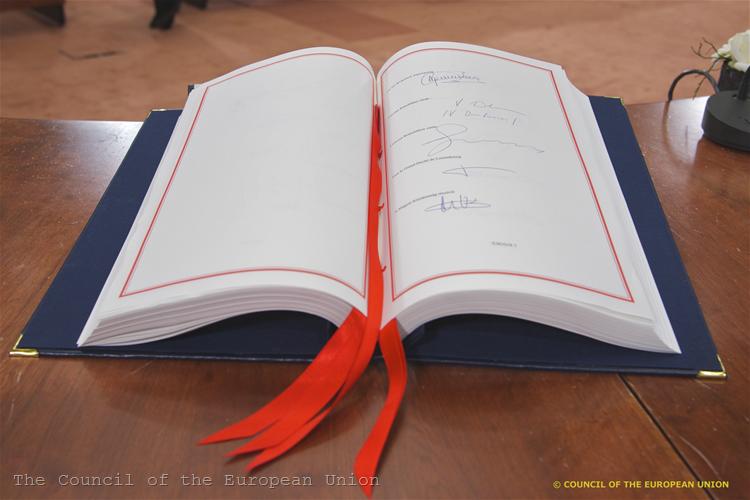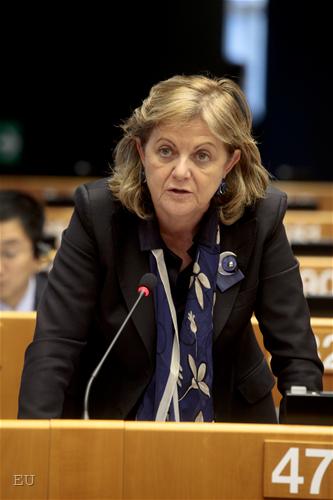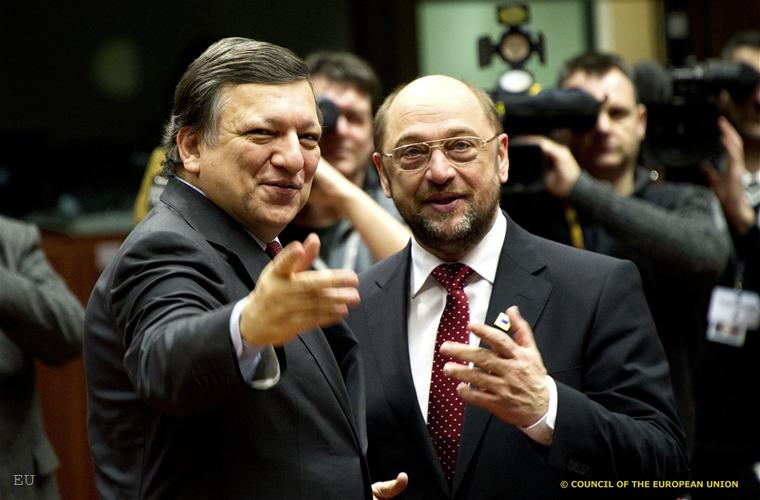The Battle for the Fiscal Compact In Anticipation of the Fourth Draft
Ralitsa Kovacheva, January 18, 2012
 On Thursday there will be another, fourth version of the text of the intergovernmental treaty for enhanced economic and monetary union, the so called Fiscal Pact, which is expected to be signed by 26 EU member states. A day earlier the European Parliament is to adopt a resolution on the matter, which in fact will already be outdated compared to the new text of the future agreement. MEPs dissatisfaction with this fact and with the negotiations as a whole was clearly demonstrated during the common meeting of the parliamentary committees on economic (ECON) and constitutional (AFCO) affairs late on Monday, 16 January. The lawmakers discussed the third draft of the treaty, of which they received a printed copy stamped "confidential". The British MEP from the European Conservatives and Reformists Group, Vicky Ford, drew her colleagues' attention to the fact that the draft had long been published by Open Europe. Let's not pretend that it is confidential, it's pretty stupid, Ms Ford called.
On Thursday there will be another, fourth version of the text of the intergovernmental treaty for enhanced economic and monetary union, the so called Fiscal Pact, which is expected to be signed by 26 EU member states. A day earlier the European Parliament is to adopt a resolution on the matter, which in fact will already be outdated compared to the new text of the future agreement. MEPs dissatisfaction with this fact and with the negotiations as a whole was clearly demonstrated during the common meeting of the parliamentary committees on economic (ECON) and constitutional (AFCO) affairs late on Monday, 16 January. The lawmakers discussed the third draft of the treaty, of which they received a printed copy stamped "confidential". The British MEP from the European Conservatives and Reformists Group, Vicky Ford, drew her colleagues' attention to the fact that the draft had long been published by Open Europe. Let's not pretend that it is confidential, it's pretty stupid, Ms Ford called.
The Parliament, although not a contracting party, is involved in the working group drafting the treaty, represented by three MEPs: Elmar Brok (EPP, Germany), Roberto Gualtieri (Socialists and Democrats, Italy) and Guy Verhofstadt (ALDE, Belgium). Only one of the three - Socialist Roberto Gualtieri - was able to come to the meeting to acquaint his colleagues with some behind the scene details. The last working group meeting was on Friday 13 January, when the representatives of the European Parliament expressed their dissatisfaction with the third draft of the document. According to Roberto Gualtieri it was a "very bad draft" because it ignored Parliament`s demands. He hopes this to be corrected in the next draft text that will be released on Thursday.
MEPs assesses as victory the change of Article 3 of the Treaty (namely the Fiscal  Compact), where in the latest version the term "reference value" is replaced with "medium-term objective" as defined in the Stability and Growth Pact. This, according to the lawmakers, is an important step towards synchronising the text with the European legislation. There is a problem with the provision that the budget deficit should not exceed "0.5% of GDP at market prices" because there is no such threshold in the European legislation. However, the Commission is ready to make a proposal fixing this weakness. As a whole, MEPs disagree the treaty to introduce new, more stringent criteria, which are missing in the European legislation. And the proposals of the European Central Bank (ECB) were precisely in this direction, as it became clear from Mr Gualtieri's words.
Compact), where in the latest version the term "reference value" is replaced with "medium-term objective" as defined in the Stability and Growth Pact. This, according to the lawmakers, is an important step towards synchronising the text with the European legislation. There is a problem with the provision that the budget deficit should not exceed "0.5% of GDP at market prices" because there is no such threshold in the European legislation. However, the Commission is ready to make a proposal fixing this weakness. As a whole, MEPs disagree the treaty to introduce new, more stringent criteria, which are missing in the European legislation. And the proposals of the European Central Bank (ECB) were precisely in this direction, as it became clear from Mr Gualtieri's words.
At this stage, the Member States do not support the Parliament’s request, except measures to maintain fiscal stability, the treaty to provide also measures aimed at achieving growth and jobs - namely to establish a debt redemption fund, to create Eurobonds and to introduce a financial transaction tax (FTT). Member States wanted the treaty to refer to the Euro Plus Pact, but lawmakers disagree because the pact is an intergovernmental agreement too. The Commission has made a compromise proposal a reference to be included to its proposal for “stability bonds”.
 As expected, MEPs are not happy that the treaty does not provide a role for the European Parliament. They specifically rebuked Articles 12 and 13 of the future treaty in chapter "Governance of the Euro Area”. Article 12 defines the rules for conducting summits of the euro area, which will be attended by the presidents of the Commission and the ECB, but not of the European Parliament. The latest draft provides for the Parliament only to be informed, but some lawmakers found it offensive to Parliament and suggested the text to be deleted.
As expected, MEPs are not happy that the treaty does not provide a role for the European Parliament. They specifically rebuked Articles 12 and 13 of the future treaty in chapter "Governance of the Euro Area”. Article 12 defines the rules for conducting summits of the euro area, which will be attended by the presidents of the Commission and the ECB, but not of the European Parliament. The latest draft provides for the Parliament only to be informed, but some lawmakers found it offensive to Parliament and suggested the text to be deleted.
Others warned that Parliament should not be so heavily involved in the  negotiations, because ultimately this was an intergovernmental agreement. British Liberal MEP Andrew Duff warned that Parliament should not be too committed and express a strong position before the negotiations between the contracting parties are over. According to him it is also not good that the ECB is so involved in the negotiations because this is damaging the image and independence of the institution. According to Philippe Lamberts (Greens / EFA, Belgium), "the Parliament should not be a co-conspirator" in this initiative.
negotiations, because ultimately this was an intergovernmental agreement. British Liberal MEP Andrew Duff warned that Parliament should not be too committed and express a strong position before the negotiations between the contracting parties are over. According to him it is also not good that the ECB is so involved in the negotiations because this is damaging the image and independence of the institution. According to Philippe Lamberts (Greens / EFA, Belgium), "the Parliament should not be a co-conspirator" in this initiative.
MEPs are particularly sensitive in terms of Article 13 which stipulates that "representatives of the Parliaments of the Contracting Parties will be invited to meet regularly to discuss in particular the conduct of economic and budgetary policies, in close association with representatives of the European Parliament." We must prevent the creation of a third chamber without any involvement of the EP, negotiator Roberto Gualtieri appealed.
He explained that there were five or six points on which there was no consent among the countries. For example, Germany's request the ratification of the treaty to be a condition for receiving financial assistance from the European Stability Mechanism, as stated in the latest version of the text. Other countries, however, opposed such a connection between the treaty and the ESM, Mr Gualtieri explained. There are also disagreements related to the number of ratifications required for the treaty's entry into force  – in the first draft the number was 9, then became 15 and in the latest version it is 12. The ECB calls for 9, which is logical because the bank wants the treaty to enter into force as soon as possible. Some countries want the treaty to enter into force only when ratified by all eurozone countries and the Parliament believes that 15 ratifications are sufficient.
– in the first draft the number was 9, then became 15 and in the latest version it is 12. The ECB calls for 9, which is logical because the bank wants the treaty to enter into force as soon as possible. Some countries want the treaty to enter into force only when ratified by all eurozone countries and the Parliament believes that 15 ratifications are sufficient.
Some of the issues will be left to be decided by the finance ministers in the ECOFIN Council - like the link between the treaty and the ESM, as well as participation in eurozone summits by representatives of the European institutions and non-eurozone countries.
In general, MEPs statements reiterated their previous positions, that the treaty did not contribute by anything new to what had already been adopted with the legislation on economic governance - it only created confusion. This way we are putting the economic governance in the intergovernmental space, Elisa Ferreira (Socialists and Democrats, Portugal) noted. She warned that this agreement would make some countries vulnerable to the interests and initiatives by others. The Socialists and the  Greens once again united around the position, they defended during the discussions on the EU economic governance package, that fiscal stability must be supported by measures for growth and employment. "The mantra is, first the discipline and then we'll see," but fiscal discipline must be complemented by investment discipline, Philippe Lamberts (the Greens) added. We believe that the treaty is not particularly necessary and not very useful - on the contrary, it is even harmful, Socialist Roberto Gualtieri summarised.
Greens once again united around the position, they defended during the discussions on the EU economic governance package, that fiscal stability must be supported by measures for growth and employment. "The mantra is, first the discipline and then we'll see," but fiscal discipline must be complemented by investment discipline, Philippe Lamberts (the Greens) added. We believe that the treaty is not particularly necessary and not very useful - on the contrary, it is even harmful, Socialist Roberto Gualtieri summarised.
Ultimately, the Director of the Commission’s Legal Service, Luis Romero Requena, reminded lawmakers that the aim of the European institutions' involvement in the negotiations was to ensure that nothing in the text would contradict the EU law. We want to avoid fragmentation of the EU and the creation of concentric circles, he said. According to the Commission it is significant progress that some important details will not be be recorded in the treaty itself, but will be proposed by the Commission as secondary legislation after its entry into force, which will make them part of EU law.
Regarding the role of the EU Court of Justice, Luis Romero Requena explained that this could be done on the basis of Article 273 of the Treaty on functioning of the European Union (TFEU).The biggest paradox is that those who wanted an intergovernmental treaty, suddenly recalled the advantages of the Community method and now they want the Commission to act as an agent between them and to have sanctions, he noted. While stressing that the Commission was ready to play a role in the Treaty, but only if its independence and autonomy were guaranteed.
 | © The Council of the European Union
| © The Council of the European Union | © European Parliament
| © European Parliament | © The Council of the European Union
| © The Council of the European Union | © European Parliament
| © European Parliament | © EU
| © EU | © EU
| © EU